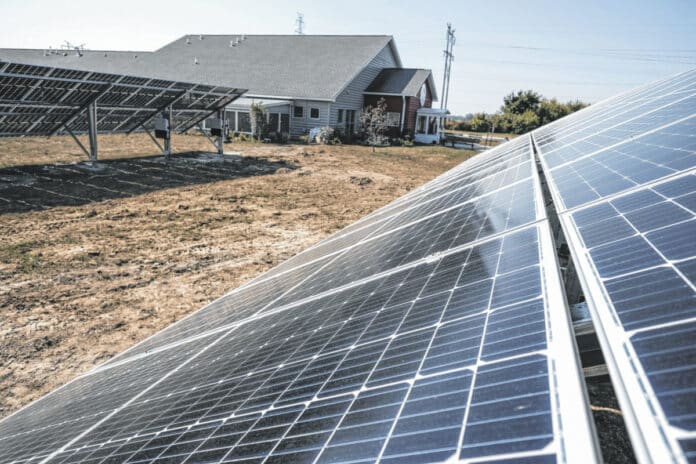The arrival of summer has allowed the Bartholomew County Humane Society to finally put new solar panels to the test.
As it turns out, the savings on the electric bill at the organization’s shelter, 4415 E. County Road 200S, have been as expected.
Before the solar panels were installed last fall, summer air conditioning of the 8,000-square-foot building caused the electric bill to climb to about $1,000 a month, long-time society member and retired educator Cheryl Zuckschwerdt-Ellsbury said.
But when June’s bill arrived, the solar panels cut the utility costs down by one-third, Zuckschwerdt-Ellsbury said.
Now that the organization is saving more than $300 a month during the summer, they will have more funds available to pay for spay and neuter surgeries, as well as invest more in outreach and medical care, shelter manager Kirsten VantWoud said in an earlier interview.
The Columbus Solar Power Initiative assisted the humane society in doing its homework of comparing different products before deciding on the 64 panel system, Zuckschwerdt-Ellsbury said. Another significant decision was to install the panels at ground level on about five acres of unused land, rather than to attach them to the roof.
That was followed by nearly a year of fundraising before the $46,000 required for the purchase was secured, Zuckschwerdt-Ellsbury said.
The two largest grant providers are the Heritage Fund — The Community Foundation of Bartholomew Count and the Henry Conover Foundation. Additional funds were provided through the Custer-Nugent Foundation and individual donors, she said.
The panels were installed in about two weeks by technicians from Solar Energy Solutions LLC. Headquartered in Lexington, Kentucky, the company had just completed larger projects for Northside Middle and Taylorsville Elementary schools before being hired to cut energy bills at the animal shelter.
Once the panels were in place, the project came to a sudden stop. A contractor hired to install a power conversion generator hooked up equipment with an insufficient load capacity, Zuckschwerdt-Ellsbury said.
While the humane society was able to secure funds from another foundation to get the right type of generator, it did result in a delay that kept the solar panels from being put online until November, she said.





